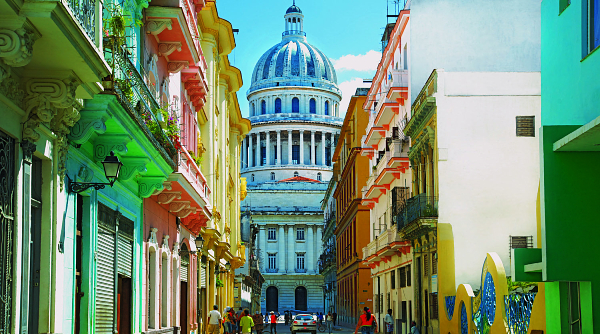If you are a first-time traveler to Cuba, you’ll likely find the trip confusing and possibly even frustrating because this island is different from most others in the Caribbean. The most obvious reason, of course, is their political leaning. However, there is also a dual currency system that can be puzzling, and the lack of reliable internet connection makes matters worse since Googling for information and answers isn’t as easy as it likely is at home. So we’ve put together a helpful list of pro tips to assist you with your vacation plans.
1. When to Travel – The Caribbean islands are beautiful any time of year. However, it should be noted that while many people travel during the summer months because children are out of school, May to October are the hottest and most humid months, in addition to being the rainy season. Unfortunately, it’s also hurricane season. For more reliable weather, travel during the dry season, from November to April.
2. Buy Travel Insurance – No matter where your trip might take you, it’s always wise to buy travel insurance to cover any mishaps or emergencies that might happen during your trip – lost luggage, sudden health problems or accidents, evacuation due to inclement weather, etc. It’s also wise to know exactly what your policy includes and expects of you so you’re not confused or guessing should one of those emergencies arise. Ideally, you won’t have to use it but it’s good to know you have it just in case. The ‘just in case’ part does not apply to Cuba. Travel insurance is a requirement to enter the country. Make sure you’re prepared.
3. Pack Essentials – Understand that Cuba does not have a well-stocked Walmart or CVS drugstore on every corner… or ANY corner. This is an island with a rationed economy so some supplies will be difficult to find. Rather than risk disappointment, be sure to pack all essentials, such as prescribed medications and over-the-counter meds you regularly take or might need, such as Tylenol, antihistamines, and Gravol. Consider first aid supplies like Polysporin and bandages as well as sunscreen, hand sanitizer, feminine hygiene products, and toiletries. Since large shampoo bottles are a concern for air travel, buy it bar form. A water bottle with a filter is recommended due to Cuba’s poor quality of drinking water, as is bug repellent since mosquitos are problematic, particularly during the wet season. Include a portable charger for electronics and a power plug converter (pin adapter) for Europeans.
Pack clothing items according to weather conditions and all the activities you have planned. Casual clothing is advisable; leave designer clothing and expensive watches and jewelry at home.
4. Book Rental Cars and Tours in Advance – If you plan to rent a car, don’t wait until your arrival in Cuba to make the arrangements. Rental inventory is scarce, so travelers are advised to reserve 2-3 months ahead of their trip. For more information and rental companies, click HERE.
Similarly, tours and experiences can book up quickly so do your research ahead of time. There are plenty of tours available for booking online. So, figure out what you want to see and do, plan an itinerary, and then reserve your place well in advance. Print and pack any pertinent paperwork, and make sure to keep confirmation emails on your phone. Book with reputable companies and tour guides.
5. Airport Arrival – Cuba’s airports are like many Caribbean airports – hot, humid, and chaotic. The bathrooms leave a lot to be desired, and line-ups at customs are long. The exterior is just as unorganized with a multitude of state and private taxis, resort transfers and shuttles, car rental facilities, and people everywhere. That type of atmosphere invites problems, so remain focused. Keep young children close, keep your luggage locked and in hand (never leave it unattended), and go directly to your mode of transportation. If you are supposed to board a shuttle bus or transfer service, don’t keep them waiting.
6. Get Comfortable with the Currency – Cuba employs a confusing system of two currencies that includes the CUC (Cuban Convertible Peso) and the CUP (Cuban Peso). CUP is the only currency that can be used by tourists and is accepted at all resorts and hotels, restaurants, and attractions. Travelers can exchange their currency for CUP at banks, hotels, airports, and CADECA (state currency exchange offices). Very few businesses accept debit or credit cards, and credit cards issued by U.S. banks are not accepted at all. So, tourists need to take enough cash to cover the things they wish to do on the trip. But be discreet, don’t flash it, and whenever possible, lock some of it up in your hotel safe. Also, pay attention to how much change you receive from purchases, and be sure to carry small bills for tipping.
7. Get a Cuban Tourist Card – To enter the country, travelers require a Visa or Cuba Tourist Card, available in pink and green. Travelers arriving directly from the U.S. will need a pink Tourist Card, travelers from everywhere else require green. These are available from your travel agency or airline, from the Cuban Embassy, or online at EasyTouristCard This card is valid for visits of up to 30 days and can be used within 180 days of issuance. DON’T LOSE IT!
8. Don’t Talk Politics – Avoid this complicated subject as a visitor to the country. Don’t mention Castro or the current government, don’t comment on the island’s current state of affairs, and don’t voice your personal opinions on the subject. Just don’t.
9. Be Careful with Food and Drink – If you don’t plan to eat at your resort or hotel, stick to Paladares, which are private restaurants, usually well-respected and family-owned. Steer clear of street food!
Don’t drink the tap water! Traveler’s diarrhea is a common illness when visiting hot and humid countries where the water system is contaminated. This can cause severe abdominal cramping, fever, sometimes nausea and vomiting, and frequent defecation with loose stool. Dehydration can become dangerous, especially for children and seniors, and it’s enough to ruin a vacation. Taking Dukoral prior to your trip is an effective drinkable treatment that prevents diarrhea caused by E Coli and Cholera present in the water. But there are other precautionary measures as well. The well-respected Mayo Clinic advises:
- Don’t consume food from street vendors.
- Avoid unpasteurized milk and dairy products, including ice cream.
- Avoid raw or undercooked meat, fish, and shellfish. Eat foods that are well cooked and served hot
- Stick to fruits and vegetables that you can peel yourself, such as bananas, oranges, and avocados.
- Stay away from salads and from any fruit you can’t peel, such as grapes and berries.
- Be aware that alcohol in a drink won’t keep you safe from contaminated water or ice.
10. Get Wi-Fi Connection – Internet access is limited in Cuba and service isn’t reliable, so for travelers that favor frequently uploading to social media, be prepared to scale back. The most reliable connectivity can be found in airports and at resorts and hotels, but often it’s only offered in the lobby, business center, or other common areas, and guests have a limited amount of time per day in which they can use it.
Another option is to purchase a NAUTA card, which can be found at some resorts, and at the offices of ETECSA (Cuba’s telecommunication company). If visiting an ETECSA office, prepare for a long line-up and excessive wait time. Customers must provide their passports and pay with Cuban pesos. Outside the offices, expect to receive offers of black-market cards that will remove the lengthy wait, but cost triple the price. We don’t recommend the latter.
Once you are finally connected, be prepared for slow service and limited bandwidth so you won’t be using the internet in the same way that you are used to at home.
11. Learn a Little of the Language – It would be of benefit to learn a few Spanish words before your trip so you can communicate more easily when you arrive, or, at very least, understand a few signs and some basic words. If you’re not prepared to dive deep into Rosetta Stone, buy a small Spanish-English guide that you can tuck into your purse or backpack for references purposes. Or make sure the Google Translate app is downloaded to your phone. Even with Cuba’s limited internet access, this app continues to work offline.
For navigation purposes, especially if you plan on some self-guided walking tours is MAPS.ME for fast, detailed, and entirely offline maps with turn-by-turn navigation.
12 Stay Alert, Stay Safe – This piece of advice should be taken seriously whenever you may roam. Actually, it should be common sense. However, we think it’s worth mentioning if your destination is Cuba. Staying alert includes such things as:
- If you don’t plan to stay at a resort, stay at private accommodations (Casas Particulares). This affordable option is similar to a bed-and-breakfast.
- If you are staying at a resort, don’t wander off the property and into unknown territory, especially at night. If you plan to leave your resort, make sure it’s with a reputable tour company or transfer service, or have the hotel concierge call a taxi for you. Just like any country, some parts of Cuba are more impoverished and dangerous than others.
- Do not get drunk and show off, draw attention to yourself by misbehaving, don’t flash cash, or go to an ATM alone or after dark.
- Women traveling together should remain together, don’t split up to do things alone. If partying at a club, do not overindulge in alcohol and lose control. Do not go to the ladies’ room or leave the club by yourself.
- Use your room safe to lock up your passport and valuables when you are not using them. If you’re planning a walking tour, refrain from placing your wallet in your back pocket or walking around with an open and easy-to-access purse or backpack. Instead, consider a money belt and pull your T-shirt overtop.
- Don’t leave valuables unattended on the beach or by the pool, such as your wallet, room key, smartphone, or camera.
- Don’t invite strange people to your room. Conversely, don’t enter a stranger’s hotel room, or venture to a stranger’s home.
- Refrain from “hooking up” with strange men or women as tempting as it might be. You never know who you’re dealing with or what their intentions are.
- Save emergency numbers to your phone just in case, including 106 for Police, +53 7839-4100 for the U.S. Embassy in Cuba, and +53 7204-2516 for the Canadian Embassy in Cuba:
Enjoy yourself as much as possible. After all, it’s your vacation and it’s meant to be fun. At the same time; however, be smart and aware. If what you are considering is something you wouldn’t do at home due to safety concerns, then it stands to reason you probably shouldn’t be doing it on vacation either.
With regard to Covid protocols, be sure to visit the GoCuba website here for up-to-date information regarding current requirements.


